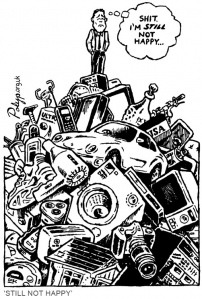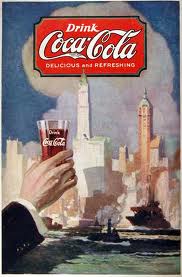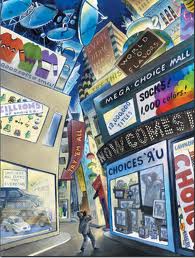 In the US consumption rates were increasing in the mid 1920s and the “new economic gospel of consumption” gained many adherents. The idea that there were limits on consumer wants began to be eclipsed by the idea that such wants could be endlessly created.
In the US consumption rates were increasing in the mid 1920s and the “new economic gospel of consumption” gained many adherents. The idea that there were limits on consumer wants began to be eclipsed by the idea that such wants could be endlessly created.
In 1929 the President’s Committee on Recent Economic Changes stated that “wants are almost insatiable; that one want satisfied makes way for another... by advertising and other promotional devices, by scientific fact finding, and by carefully predeveloped consumption, a measurable pull on production... has been created.”
The public was urged by the National Association of Manufacturers (NAM) to “end the buyers’ strike”. However the desire to consume did not come naturally, it had to be learned: “People had to move away from habits of strict thrift toward habits of ready spending.”
From the 1920s corporations began advertising to the  working classes in an effort to break down these old habits of thrift and encourage new consumerist desires. At the same time they sought to counter anti-corporate feelings generated by the conditions of work in their factories.
working classes in an effort to break down these old habits of thrift and encourage new consumerist desires. At the same time they sought to counter anti-corporate feelings generated by the conditions of work in their factories.
Higher wages helped in this shift from the Protestant ethic of asceticism to one of consumerism that fitted with the required markets for mass production. In boom times, workers were given increased wages rather than increased leisure. Between 1910 and 1929 the average purchasing power of workers in the US increased by 40%.
With these rising wages they bought more and the upward spiral of production and consumption was maintained. In earlier times higher wages might encouraged workers to work shorter hours, but once workers had been coached into becoming consumers there was little danger of this. With the help of marketers and advertisers, workers could be trusted “to spend more rather than work less.”
In this context it was important that leisure was not an alternative to work and an opportunity to reflect on life but rather a time for consumption. In this way the forty hour week, rather than threatening economic growth would foster it. Leisure goods such as radios, phonographs, movies, clothes, books and recreational facilities all benefited from increased leisure time. At the same time leisure had to be subordinate to work and importantly, a reason to work.
 Advertisers also undermined the nineteenth century “culture of character” which was the basis of the myth of the self-made man, someone who succeeded as a result of hard work, morality and discipline. In its place a “culture of personality” evolved which promoted the importance of presentation and appearance, things that advertisers were so helpfully offering to assist with. What mattered in getting ahead and influencing people was the impression a person made on others. Things like their clothes, their home furnishings, their personal cleanliness were all used by others to judge their character.
Advertisers also undermined the nineteenth century “culture of character” which was the basis of the myth of the self-made man, someone who succeeded as a result of hard work, morality and discipline. In its place a “culture of personality” evolved which promoted the importance of presentation and appearance, things that advertisers were so helpfully offering to assist with. What mattered in getting ahead and influencing people was the impression a person made on others. Things like their clothes, their home furnishings, their personal cleanliness were all used by others to judge their character.
Business people still wanted to limit the reduction of work hours and believed that by ‘educating’ workers to become consumers, the demand from workers for reduced working hours would also be limited. Manufacturers expanded markets by expanding the range of goods they produced, moving from the basic requirements of living such as food, clothing and building materials to items such as cars and radios that provided entertainment and recreation.
Department store merchant Edward Filene, a spokesperson for industrialists in the 1920s and 30s, spoke frankly about the need for social planning in order to create a consumer culture where industry could “sell to the masses all that it employs the masses to create” and the need for education to train the masses to be consumers in a world of mass production. He argued that consumer culture could unify the nation and, through education, social change could be limited to changes in the commodities that industry produced.
After the war, unions no longer pressed for shorter working hours and workers themselves became wedded to a consumer lifestyle that required long hours to support. Many unions in fact gave up their fight for control of production in favour of a share of the fruits of production and “ever-increasing levels of material well-being for their workers”.